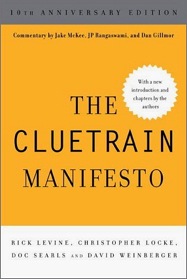 As promised this post will cover my reading of the 10th anniversary edition of The Cluetrain Manifesto. What a great book and I feel a bit embarrassed that I didn’t read this book 10 years ago. This book is entertaining, insightfull and still ahead of it’s time. A lot of things the authors talk about is taking place in some organizations but is still a long way for most organizations.
As promised this post will cover my reading of the 10th anniversary edition of The Cluetrain Manifesto. What a great book and I feel a bit embarrassed that I didn’t read this book 10 years ago. This book is entertaining, insightfull and still ahead of it’s time. A lot of things the authors talk about is taking place in some organizations but is still a long way for most organizations.
Obviously the first lessons is that “markets are conversations” and as Jake McGee outlines it is very hard to fully understand this thesis and truthfully apply it. How can you have real conversations? What is your voice, what is your opinion? How can I start a conversation? With whom?
The second lesson for me is a construct of the following theses:
8 In both a internetworked markets and amoung intranetworked employees, people are speaking to each other in a powerful new way
53 There are two conversations going on. One inside the company. One with the market.
56 These two conversations want to talk to each other. They are speaking in the same language. They recognize each other’s voices.
57 Smart companies will get out of the way and help the inevitable to happen sooner.
For me the lesson is about the conversations between comployees is equally important than conversations in the market and the conversation between employees and the market is even more important. If you understand that there are more smart people working outside your company than inside, the only smart think to do is to enable conversations between employees and the markt. This lesson is also about the changing role of the organization, embodied mostly by the communications department. Your role has to change to get out of the way and help the inevitable happen sooner. That is you need to facilitate conversations and not be the one that talks to the customer and the employee. Your work needs to move up one level and you need to think about ways to improve conversations that you cannot manage.
The third important lesson is quoted from Dan Gilmore “The ultimate [journalistic] tool is the human brain: our ability to learn, absorb and adapt. In a conversational mode, we do all of the more effectively. And what is the first rule or a conversation? To listen” Listening is also the most difficult part, that we all have forgotten how to do. Being generally interested in one and other and taking the time to focus on the other. This means to forget about your iPhone or blackberry for 10 minutes! Stop all these interruptions and focus! For a nice article on interruptions and attention look at this post form Nick Carr (thanks to @driessen).
For a great explanation of listening, watch the TEDtalk by Evelyn Glennie!
http://video.ted.com/assets/player/swf/EmbedPlayer.swf
What were your important lessons from the Cluetrain?